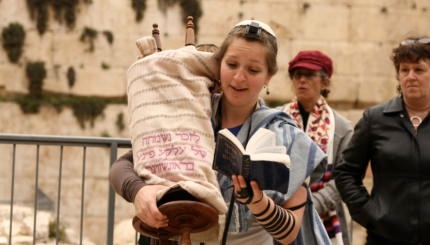When I got to rabbinical school, I found myself surprised at a particular question that arose in several conversations. “Hey Matt, what’s your kippah stance now that you’re going to be a rabbi?”
A kippah, known as a yarmulke in Yiddish and usually translated as “skullcap,” is the head covering many Jews wear to show respect and awe to God. Every time I received the question in school, I replied with the same answer: “Nothing will change about my practice. Much like the original reason for its creation, to show respect, I wear my kippah during sacred moments.”*
My practice evolved somewhat, however, as I advanced through school and I perceived an expectation that I wear it. I chose to wear it sort of like a uniform so that when I was acting in an official rabbi capacity, I would wear the kippah. Instead of just at Shabbat worship, I would wear the kippah at board meetings, while teaching religious school, and during public invocations. Even after I moved to Mississippi, as a fully ordained rabbi, my practice didn’t change for a couple of years.
Until a serious spike in anti-Muslim activity began in early 2016.
As a board member of the oldest interfaith organization in the state, the Mississippi Religious Leadership Conference, I asked what I could do, if anything, for our Muslim brothers and sisters. They were keeping a low profile, they responded; they would let me know. Then November came, and I suddenly felt the need to wear my kippah. Why, you ask? To show solidarity for those in Mississippi who are not part of the white, male, Christian majority. I wanted to walk into the grocery store and show my fellow Mississippians that we are diverse, that we are not as homogenous as the carton of Vitamin D milk I put in my cart. And that said diversity is not a threat; in fact, it can make us a more enriched community.
I have generally experienced very little anti-Semitism (the only negative experiences I can recall were where I grew up in Florida, which isn’t really the same as the rest of the South).** If anything, especially in the South, I’ve experienced “philo-Semitism.” People are intrigued and excited to meet a Jewish person in Mississippi. Folks want to know more about me, where I worship, how I feel about particular political viewpoints that may be contrary to their own. Once, when I took it off because I was driving with my windows down, the waitress at our favorite sushi spot asked me where my kippah was. It’s almost as if they were disappointed that I was bareheaded in their restaurant.
Then, Charlottesville happened. White supremacy and anti-Semitism reared their ugly heads in Virginia. Someone died. And now, while I ponder that original query about when I would wear my kippah, I find a new set of questions accompanies my thoughts on the subject.
Does wearing a kippah put a target on my back? Am I putting my family in danger when we go to the museum with that cap on my head? Will my child, born in Jackson, be treated any differently by her teachers and classmates because I walk her into class with my head covered?
In pondering taking off my kippah, to camouflage myself, I think of my grandfathers. Both of them fought in World War II to defend my right to live as a Jew, to be Jewish whenever I want, to exude Judaism in public. And, while watching the news may be a little unnerving at this moment, I know that my neighbors know I am not a faceless stereotype. I think that’s an important thing to do, especially down here — although just to be clear, it’s not that I live in the South that intimidates me; I would be having this conversation in my head regardless of where I lived. America, today, raises these questions.
But for me, the answer is that I will wear my identity proudly. I will continue to live my life here in the South, being a decent and civil citizen while trying to bring a light of righteousness to all who I encounter… with my head usually covered by a small but noticeable kippah.
* Part of the reason I don’t wear a kippah all the time is because I love baseball hats, which, of course, cover my head.
** I actually had pais, the sidelocks of hair certain Jews grow, for a time in high school – so I was pretty visible in my Jewishness, even for Florida.
kippah
Pronounced: KEE-pah or kee-PAH, Origin: Hebrew, a small hat or head covering that Orthodox Jewish men wear every day, and that other Jews wear when studying, praying or entering a sacred space. Also known as a yarmulke.



